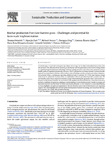Mostrar o rexistro simple do ítem
Biochar production from late-harvest grass – Challenges and potential for farm-scale implementation
| dc.contributor.author | Heinrich, Thomas | |
| dc.contributor.author | Park, Hyunjin | |
| dc.contributor.author | Orozco, Richard | |
| dc.contributor.author | Ding, Zhengqiu | |
| dc.contributor.author | Álvarez-López, Vanessa | |
| dc.contributor.author | Mosquera-Losada, María Rosa | |
| dc.contributor.author | Steinbeis, Leopold | |
| dc.contributor.author | Hoffmann, Thomas | |
| dc.date.accessioned | 2023-04-26T16:04:26Z | |
| dc.date.available | 2023-04-26T16:04:26Z | |
| dc.date.issued | 2023 | |
| dc.identifier.citation | Heinrich, T., Park, H., Orozco, R., Ding, Z., Álvarez-López, V., Mosquera-Losada, M. R., Steinbeis, L., Hoffmann, T. (2023). Biochar production from late-harvest grass–Challenges and potential for farm-scale implementation. Sustainable Production and Consumption, 37, 256-267. https://doi.org/10.1016/j.spc.2023.02.019 | es_ES |
| dc.identifier.uri | http://hdl.handle.net/2183/32948 | |
| dc.description.abstract | [Abstract:] Grasslands play a crucial role in European agriculture and ecology, but are often underutilized due to low-value end-products. The utilisation of late-harvest grass for biochar and heat generation on farm-level is being studied as a potential negative emissions technology. Technical (energy provision and carbon sink), economic (cost vs. benefit), political (regulatory framework) and social (SWOT) perspectives are being evaluated. Technical feasibility has been demonstrated with three different farm-scale technologies and the energetic and carbon-sink potential evaluated. When a continuously operating allothermal unit is evaluated, 35 % of the input biomass energy content can be utilized for heating a farm, in combination with the potential to provide a carbon sink. The cost-benefit analysis shows important monetary savings when including the agronomic value (based on the market price) of the produced biochar. An assessment of the regulatory framework of biochar production in Germany presents a multitude of regulations applying to such technologies some of which provide a hurdle to navigate and may incur excessive costs for farmers as small-scale biochar producers. A SWOT analysis of a case in Brandenburg, Germany highlights strengths and opportunities, but also obstacles such as lack of infrastructure and regulatory support. This study highlights the need for further development of suitable technology and research on the long-term economic and carbon sink potential of biochar. | es_ES |
| dc.description.sponsorship | This work was performed within the GO-GRASS project and has received funding from the European Union's Horizon 2020 research and innovation programme under grant agreement number 862674. We thank all the partners who collaborated with the data collection. We would also like to thank Philipp Grundmann for the coordination of the GO-GRASS project. | |
| dc.language.iso | eng | es_ES |
| dc.publisher | Elsevier | es_ES |
| dc.relation | info:eu-repo/grantAgreement/EC/H2020/862674 | es_ES |
| dc.relation.uri | https://doi.org/10.1016/j.spc.2023.02.019 | es_ES |
| dc.rights | Atribución-NoComercial-SinDerivadas 3.0 España | es_ES |
| dc.rights.uri | http://creativecommons.org/licenses/by-nc-nd/3.0/es/ | * |
| dc.subject | Grass | es_ES |
| dc.subject | Biochar | es_ES |
| dc.subject | Negative emissions technology | es_ES |
| dc.subject | Regulatory assessment | es_ES |
| dc.subject | SWOT | es_ES |
| dc.title | Biochar production from late-harvest grass – Challenges and potential for farm-scale implementation | es_ES |
| dc.type | info:eu-repo/semantics/article | es_ES |
| dc.rights.access | info:eu-repo/semantics/openAccess | es_ES |
| UDC.journalTitle | Sustainable Production and Consumption | es_ES |
| UDC.volume | 37 | es_ES |
| UDC.startPage | 256 | es_ES |
| UDC.endPage | 267 | es_ES |
| dc.identifier.doi | 10.1016/j.spc.2023.02.019 |
Ficheiros no ítem
Este ítem aparece na(s) seguinte(s) colección(s)
-
GI- AQUATERRA - Artigos [46]
-
OpenAIRE [288]






